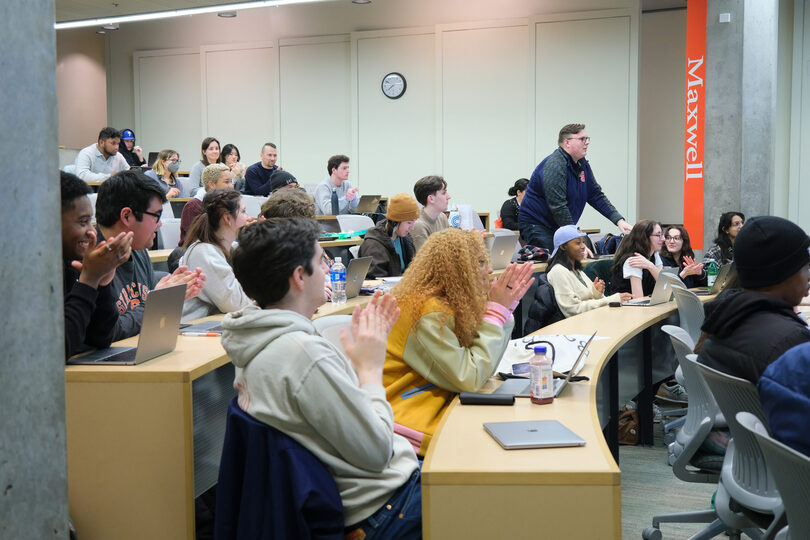Student Association announces formation of Micron advisory council

During Monday’s meeting, Syracuse University’s Student Association passed a bill to advocate for prevention and treatment of lead poisoning in the city of Syracuse. The bill was voted on by the entire SA assembly. Maxine Brackbill | Asst. Photo Editor
Get the latest Syracuse news delivered right to your inbox.
Subscribe to our newsletter here.
Syracuse University’s Student Association announced at Monday’s meeting they will create a Micron student advisory council after meeting with Dean J. Cole Smith of the College of Computer Science last week.
President David Bruen and Vice President Adia Santos said the council is important for SU students to establish a relationship with Micron, the semiconductor microchip manufacturing company that’s building a plant in Clay.
On Feb. 17, SA leaders met with Robert Simmons III, the head of social impact and STEM programs for the Micron foundation, to discuss the company’s investment in the Syracuse community, as well as its relationship with SU.
“This advisory council is going to be really important, because it’s supposed to be something that’s long lasting and is going to be here well past all of us actually attending here,” Santos said. “Eventually, this is probably going to be something that we use to follow things for student resources, even like job applications or talking about how to get involved with Micron.”
Assembly Representative and Speaker Pro Tempore Anna Ginelli also emphasized the council’s importance in strengthening SU’s connections to the surrounding region.
“This thing is really beneficial because we’re always like, ‘oh, we have such a disconnect from the community in Syracuse,’ but this is going to make so many jobs for Syracuse people,” Ginelli said. “So giving them our support in any way through this council is super beneficial.”
SA also proposed a bill in Monday’s meeting to advocate for improved prevention and treatment of lead poisoning in Syracuse as it faces a lead crisis.
Bruen emphasized how SU students should use their voices to make progress in fixing this issue, since they too are part of the Syracuse community.
“Although it hasn’t — as far as I know — dramatically impacted students on this campus, we have a responsibility to address issues in the Syracuse community because of the great advantages that we get from being here,” Bruen said. “So it’s really vital that we do everything we can from this hill to try and improve the entire city and communities around us.”
Bruen added that despite federal and state-level actions to mitigate lead levels, local government officials and landlords haven’t used those resources to their advantage as much as they could have. Bruen said the local government should improve access to testing, treating and preventing lead poisoning.
Kayla Turner, SA’s director of relationship violence advocacy, agreed with Bruen that SA members need to take action in order to push the city to fully support the movement. She said the city’s $150,000 allotment isn’t enough to help the issue.
“(Bruen) came with me to one of our lead crisis meetings, and we discussed with folks in the community who encounter this issue every day. And it’s very emotional, but also a big, big concern,” Turner said. “It’s a health crisis.”
Other Business:
On April 12, SA will hold an open table session under the “No Problem Too Small” initiative, where members will talk to students one-on-one about campus concerns.
SA elected Narahi Fernandez, a sophomore studying finance and political science on the pre-law track, as an Associate Justice.
SA met with SU’s Chief Operating Officer John Papazoglou to urge the use of meal swipes in the Schine Student Center. SA passed a bill in support of this movement.
The Syracuse Formal, a social dance for all SU students, will be held March 24.





